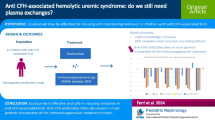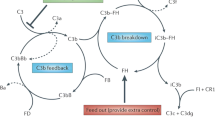Abstract
Background
Deficiency of complement factor H-related plasma proteins and complement factor H autoantibody-positive hemolytic uremic syndrome (DEAP-HUS), which is characterized by the deficiency of complement-factor H-related (CFHR) plasma proteins and the subsequent formation of autoantibodies against complement factor H (CFH), has been reported to have an adverse outcome in one third of patients. Therapy options include prompt removal of antibodies by plasma exchange and immunosuppressive therapy. Recently, restoration of complement control using the monoclonal antibody eculizumab has been shown to be effective as first- and as second-line therapy in cases of therapy resistance or severe side effects of the applied therapy.
Diagnosis/treatment
Here, we report a 6-year-old girl with DEAP-HUS and first-line therapy with eculizumab under immunosuppressive therapy with glucocorticoids and mycophenolate mofetil (MMF). This therapy led to a prompt and sustained clinical recovery, to a stable reduction of complement activation, and to a rapid decline in autoantibody titer. A second increase in the autoantibody titer was successfully treated with methylprednisolone and the child remained in remission. After 8.3 months of sustained complement control and 4.5 months of stable antibody suppression, eculizumab was successfully discontinued without any sign of relapse.
Conclusions
To our knowledge, this is the first reported case of a child with DEAP-HUS treated with the combination of eculizumab and immunosuppression as first-line therapy avoiding any HUS- or therapy-related complications and resulting in prompt clinical recovery. Importantly, clinical remission is maintained after discontinuation of eculizumab under stable immunosuppression.

Similar content being viewed by others
Abbreviations
- ADAMTS13:
-
A disintegrin and metalloproteinase with thrombospondin-1 motifs (13th member of the family)
- aHUS:
-
Atypical hemolytic uremic syndrome
- ANAs:
-
Anti-nuclear antibodies
- ANCAs:
-
Anti-neutrophil cytoplasmic antibodies
- AUC:
-
Area under the curve
- BSA:
-
Body surface area
- CFH/CFI/CFB:
-
Complement factor H/I/B
- CFHR:
-
Complement factor H-related
- CKD:
-
Chronic kidney disease
- DEAP-HUS:
-
Deficiency of complement factor H-related plasma proteins and complement factor H autoantibody-positive hemolytic uremic syndrome
- DGKE:
-
Diacylglycerol kinase epsilon
- IS:
-
Immunosuppression
- LDH:
-
Lactate dehydrogenase
- MMACHC:
-
Methylmalonic aciduria and homocystinuria type C protein
- MMF:
-
Mycophenolate mofetil
- MPA:
-
Mycophenolic acid
- PI:
-
Plasma infusions
- RRT:
-
Renal replacement therapy
- sC5b-9:
-
Soluble C5b-9
- THBD:
-
Thrombomodulin
- TPE:
-
Therapeutic plasma exchange
References
Loirat C, Fakhouri F, Ariceta G, Besbas N, Bitzan M, Bjerre A, Coppo R, Emma F, Johnson S, Karpman D, Landau D, Langman CB, Lapeyraque AL, Licht C, Nester C, Pecoraro C, Riedl M, van de Kar NC, Van de Walle J, Vivarelli M, Frémeaux-Bacchi V, HUS International (2016) An international consensus approach to the management of atypical hemolytic uremic syndrome in children. Pediatr Nephrol 31:15–39
Kavanagh D, Goodship T (2010) Genetics and complement in atypical HUS. Pediatr Nephrol 25:2431–2442
Zipfel PF, Mache C, Müller D, Licht C, Wigger M, Skerka C, European DEAP-HUS Study Group (2010) DEAP-HUS: deficiency of CFHR plasma proteins and autoantibody-positive form of hemolytic uremic syndrome. Pediatr Nephrol 25:2009–2019
Józsi M, Licht C, Strobel S, Zipfel SL, Richter H, Heinen S, Zipfel PF, Skerka C (2008) Factor H autoantibodies in atypical hemolytic uremic syndrome correlate with CFHR1/CFHR3 deficiency. Blood 111:1512–1514
Goodship TH, Cook HT, Fakhouri F, Fervenza FC, Frémeaux-Bacchi V, Kavanagh D, Nester CM, Noris M, Pickering MC, Rodríguez de Córdoba S, Roumenina LT, Sethi S, Smith RJ, Participants C (2016) Atypical hemolytic uremic syndrome and C3 glomerulopathy: conclusions from a “Kidney Disease: Improving Global Outcomes” (KDIGO) Controversies Conference. Kidney Int. doi:10.1016/j.kint.2016.10.005
Legendre CM, Licht C, Muus P, Greenbaum LA, Babu S, Bedrosian C, Bingham C, Cohen DJ, Delmas Y, Douglas K, Eitner F, Feldkamp T, Fouque D, Furman RR, Gaber O, Herthelius M, Hourmant M, Karpman D, Lebranchu Y, Mariat C, Menne J, Moulin B, Nürnberger J, Ogawa M, Remuzzi G, Richard T, Sberro-Soussan R, Severino B, Sheerin NS, Trivelli A, Zimmerhackl LB, Goodship T, Loirat C (2013) Terminal complement inhibitor eculizumab in atypical hemolytic-uremic syndrome. N Engl J Med 368:2169–2181
Greenbaum LA, Fila M, Ardissino G, Al-Akash SI, Evans J, Henning P, Lieberman KV, Maringhini S, Pape L, Rees L, van de Kar NC, Vande Walle J, Ogawa M, Bedrosian CL, Licht C (2016) Eculizumab is a safe and effective treatment in pediatric patients with atypical hemolytic uremic syndrome. Kidney Int 89:701–711
Sinha A, Gulati A, Saini S, Blanc C, Gupta A, Gurjar BS, Saini H, Kotresh ST, Ali U, Bhatia D, Ohri A, Kumar M, Agarwal I, Gulati S, Anand K, Vijayakumar M, Sinha R, Sethi S, Salmona M, George A, Bal V, Singh G, Dinda AK, Hari P, Rath S, Dragon-Durey MA, Bagga A, Indian HUS Registry (2014) Prompt plasma exchanges and immunosuppressive treatment improves the outcomes of anti-factor H autoantibody-associated hemolytic uremic syndrome in children. Kidney Int 85:1151–1160
Khandelwal P, Gupta A, Sinha A, Saini S, Hari P, Dragon Durey MA, Bagga A (2015) Effect of plasma exchange and immunosuppressive medications on antibody titers and outcome in anti-complement factor H antibody-associated hemolytic uremic syndrome. Pediatr Nephrol 30:451–457
Noone D, Waters A, Pluthero FG, Geary DF, Kirschfink M, Zipfel PF, Licht C (2014) Successful treatment of DEAP-HUS with eculizumab. Pediatr Nephrol 29:841–851
Ardissino G, Testa S, Possenti I, Tel F, Paglialonga F, Salardi S, Tedeschi S, Belingheri M, Cugno M (2014) Discontinuation of eculizumab maintenance treatment for atypical hemolytic uremic syndrome: a report of 10 cases. Am J Kidney Dis 64:633–637
Diamante Chiodini B, Davin JC, Corazza F, Khaldi K, Dahan K, Ismaili K, Adams B (2014) Eculizumab in anti-factor h antibodies associated with atypical hemolytic uremic syndrome. Pediatrics 133:e1764–e1768
Hisano M, Ashida A, Nakano E, Suehiro M, Yoshida Y, Matsumoto M, Miyata T, Fujimura Y, Hattori M (2015) Autoimmune-type atypical hemolytic uremic syndrome treated with eculizumab as first-line therapy. Pediatr Int 57:313–317
Ardissino G, Possenti I, Tel F, Testa S, Salardi S, Ladisa V (2015) Discontinuation of eculizumab treatment in atypical hemolytic uremic syndrome: an update. Am J Kidney Dis 66:172–173
Fakhouri F, Delmas Y, Provot F, Barbet C, Karras A, Makdassi R, Courivaud C, Rifard K, Servais A, Allard C, Besson V, Cousin M, Châtelet V, Goujon JM, Coindre JP, Laurent G, Loirat C, Frémeaux-Bacchi V (2014) Insights from the use in clinical practice of eculizumab in adult patients with atypical hemolytic uremic syndrome affecting the native kidneys: an analysis of 19 cases. Am J Kidney Dis 63:40–48
Fakhouri F, Fila M, Provôt F, Delmas Y, Barbet C, Châtelet V, Rafat C, Cailliez M, Hogan J, Servais A, Karras A, Makdassi R, Louillet F, Coindre JP, Rondeau E, Loirat C, Frémeaux-Bacchi V (2017) Pathogenic variants in complement genes and risk of atypical hemolytic uremic syndrome relapse after eculizumab discontinuation. Clin J Am Soc Nephrol 12:50–59
Johnson S, Stojanovic J, Ariceta G, Bitzan M, Besbas N, Frieling M, Karpman D, Landau D, Langman C, Licht C, Pecoraro C, Riedl M, Siomou E, van de Kar N, Walle JV, Loirat C, Taylor CM (2014) An audit analysis of a guideline for the investigation and initial therapy of diarrhea negative (atypical) hemolytic uremic syndrome. Pediatr Nephrol 29:1967–1978
Green H, Harari E, Davidovits M, Blickstein D, Grossman A, Gafter U, Gafter-Gvili A (2014) Atypical HUS due to factor H antibodies in an adult patient successfully treated with eculizumab. Ren Fail 36:1119–1121
Hofer J, Janecke AR, Zimmerhackl LB, Riedl M, Rosales A, Giner T, Cortina G, Haindl CJ, Petzelberger B, Pawlik M, Jeller V, Vester U, Gadner B, van Husen M, Moritz ML, Würzner R, Jungraithmayr T, German-Austrian HUS Study Group (2013) Complement factor H-related protein 1 deficiency and factor H antibodies in pediatric patients with atypical hemolytic uremic syndrome. Clin J Am Soc Nephrol 8:407–415
Dragon-Durey MA, Sethi SK, Bagga A, Blanc C, Blouin J, Ranchin B, André JL, Takagi N, Cheong HI, Hari P, Le Quintrec M, Niaudet P, Loirat C, Fridman WH, Frémeaux-Bacchi V (2010) Clinical features of anti-factor H autoantibody-associated hemolytic uremic syndrome. J Am Soc Nephrol 21:2180–2187
Licht C, Noone D (2014) Treatment of DEAP-HUS—seeking the best strategy. Pediatr Nephrol 29:941–942
Watson R, Lindner S, Bordereau P, Hunze EM, Tak F, Ngo S, Zipfel PF, Skerka C, Dragon-Durey MA, Marchbank KJ (2014) Standardisation of the factor H autoantibody assay. Immunobiology 219:9–16
Weber LT (2015) Therapeutic drug monitoring in pediatric renal transplantation. Pediatr Nephrol 30:253–265
Author information
Authors and Affiliations
Corresponding author
Ethics declarations
Support/funding
There was no financial support or funding for this study
Conflicts of interest
AH and BBB received fees for invited lectures from Alexion. MK received fees for invited lectures and advisory board meetings from Alexion and for lectures from Euro Diagnostica. PFZ received lecture fees from Alexion. LTW is a member of the Scientific Advisory Board of Alexion. RE and SH declare that they have no conflicts of interest.
Rights and permissions
About this article
Cite this article
Hackl, A., Ehren, R., Kirschfink, M. et al. Successful discontinuation of eculizumab under immunosuppressive therapy in DEAP-HUS. Pediatr Nephrol 32, 1081–1087 (2017). https://doi.org/10.1007/s00467-017-3612-9
Received:
Revised:
Accepted:
Published:
Issue Date:
DOI: https://doi.org/10.1007/s00467-017-3612-9




